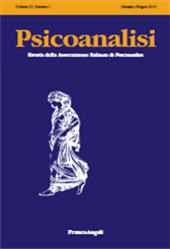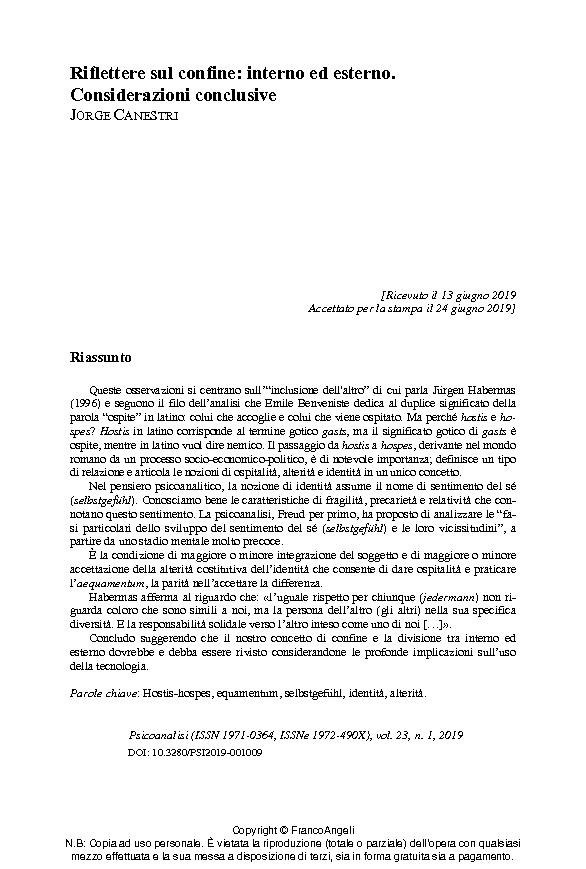Riflettere sul confine : interno ed esterno : considerazioni conclusive
85-90 p.
Queste osservazioni si centrano sull'"inclusione dell'altro" di cui parla Jürgen Habermas (1996) e seguono il filo dell'analisi che Emile Benveniste dedica al duplice significato della parola "ospite" in latino: colui che accoglie e colui che viene ospitato. Ma perché hostis e hospes? Hostis in latino corrisponde al termine gotico gasts, ma il significato gotico di gasts è ospite, mentre in latino vuol dire nemico. Il passaggio da hostis a hospes, derivante nel mondo romano da un processo socio-economico-politico, è di notevole importanza; definisce un tipo di relazione e articola le nozioni di ospitalità, alterità e identità in un unico concetto. Nel pensiero psicoanalitico, la nozione di identità assume il nome di sentimento del sé (selbstgefühl). Conosciamo bene le caratteristiche di fragilità, precarietà e relatività che connotano questo sentimento. La psicoanalisi, Freud per primo, ha proposto di analizzare le "fasi particolari dello sviluppo del sentimento del sé (selbstgefühl) e le loro vicissitudini",
a partire da uno stadio mentale molto precoce. È la condizione di maggiore o minore integrazione del soggetto e di maggiore o minore accettazione della alterità costitutiva dell'identità che consente di dare ospitalità e praticare l'aequamentum, la parità nell'accettare la differenza. Habermas afferma al riguardo che: «l'uguale rispetto per chiunque (jedermann) non riguarda coloro che sono simili a noi, ma la persona dell'altro (gli altri) nella sua specifica diversità. E la responsabilità solidale verso l'altro inteso come uno di noi [..]». Concludo suggerendo che il nostro concetto di confine e la divisione tra interno ed esterno dovrebbe e debba essere rivisto considerandone le profonde implicazioni sull'uso della tecnologia. [Testo dell'editore].
These observations focus on the "inclusion of the other" mentioned by Jürgen Habermas (1996) and follow the thread of the analysis that Emile Benveniste dedicates to the two meanings of the word "guest" in Latin: the one who welcomes and the other who is hosted. But why hostis and hospes? Hostis in Latin corresponds to the Gothic term gasts, but the Gothic meaning of gasts is host, while in Latin it means enemy. The transition from hostis to hostes, deriving in the Roman world from a socio-economic-political process, is of considerable importance; defines a type of relationship and articulates the notions of hospitality, otherness and identity in a single concept. In psychoanalytic thinking, the notion of identity takes the name of feeling of the self (selbstgefühl). We are aware of the characteristics of fragility, precariousness and relativity that this feeling identifies. Psychoanalysis, Freud first, proposed to analyze the "particular phases of the development of the feeling of the self (selbstgefühl) and
their vicissitudes", starting from a very early mental stage. It is the condition of greater or lesser integration of the subject and of greater or lesser acceptance of the constitutive otherness of the identity that allows us to give hospitality and practice the aequamentum, equality in accepting the difference. Habermas states in this regard that: «the equal respect for anyone (jedermann) does not re-examine those who are like us, but the person of the other (the others) in his specific diversity. And the responsibility in solidarity with others understood as one of us [...]».nclude by suggesting that our concept of boundary and the division between internal and external should and should be reviewed considering its profound implications for the use of technology. [Publisher's text].
-
Articoli dello stesso fascicolo (disponibili singolarmente)
-
Informazioni
Codice DOI: 10.3280/PSI2019-001009
ISSN: 1972-490X
PAROLE CHIAVE
- Hostis-hospes, equamentum, selbstgefühl, identità, alterità
- Hostis-hospes, equamentum, selbstgefühl, identity, alterity



